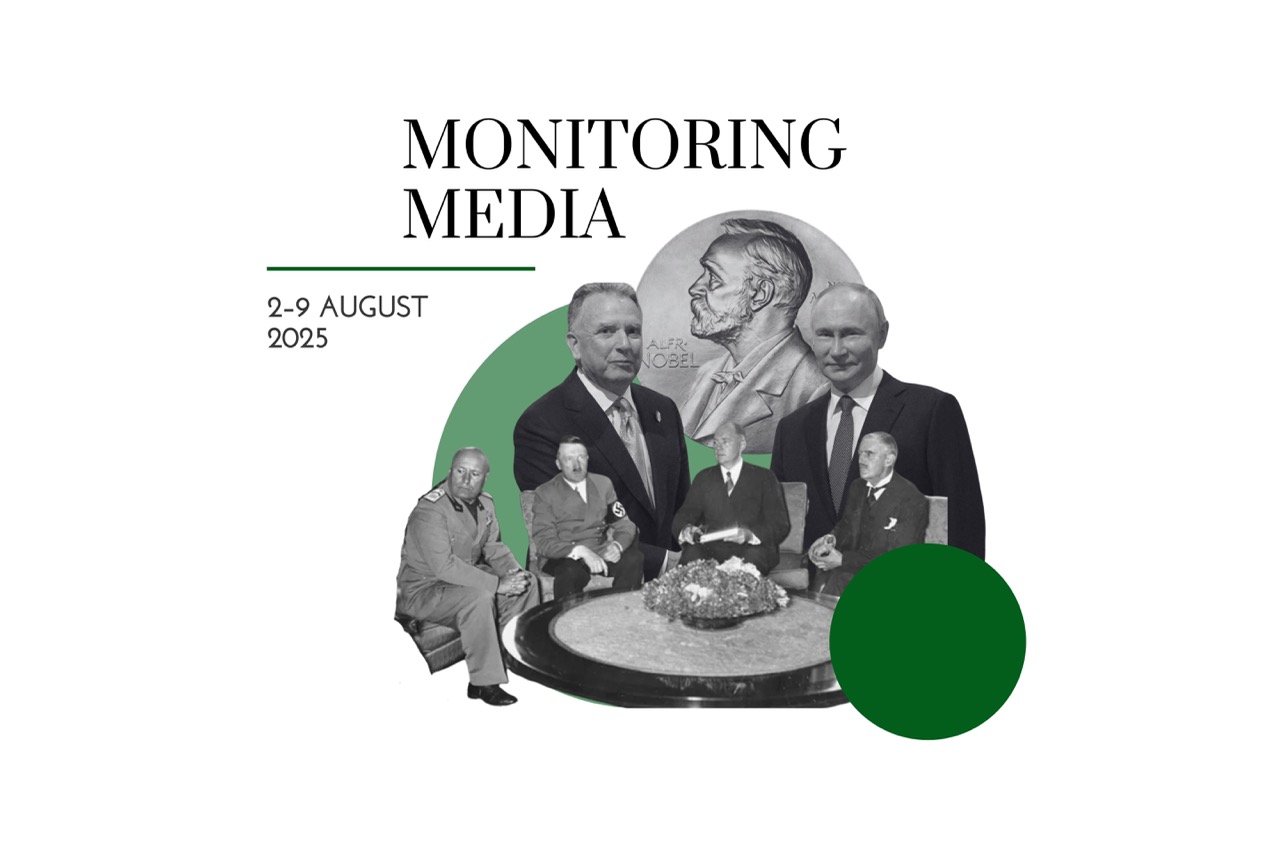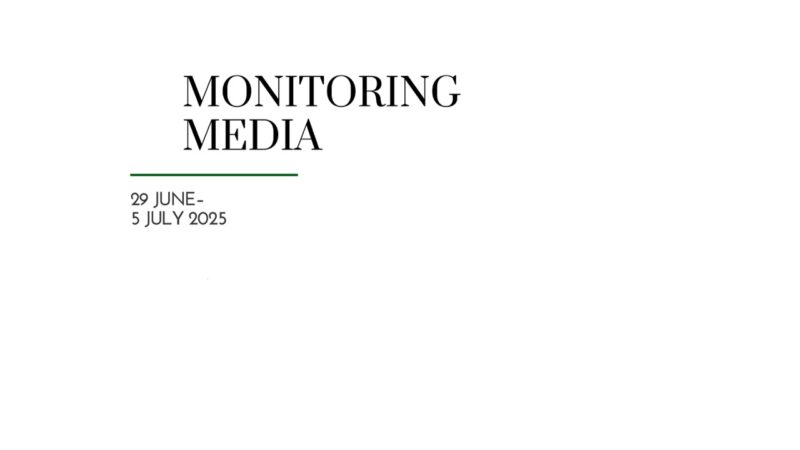Russia is on the brink of collapse

CIUS weekly report on North American media coverage of Ukrainian affairs, 2–9 August 2025
Five publications (National Interest, Foreign Policy, The New York Times, The Globe and Mail, and The Washington Post) were selected to prepare this report on how Ukraine has been portrayed in the North American press during the past week. The sample was compiled based on their impact on public opinion as well as on their professional reputation, popularity among the readership, and topical relevance. These publications represent centrist viewpoints on the political spectrum.
This MMS report covers only the most-read and relevant articles about Ukraine, as ranked by the respective North American publications themselves in the past week. Its scope covers promoted articles on home pages and articles from special sections on Ukraine, with the hashtag #Ukraine, from the paper editions of the publications, and about Ukraine from opinion columns and editorials.
Featured topics
- The world and Ukraine: US should start the next round of sanctions against Russia; Trump’s ultimatum to Putin must be matched with full-force sanctions.
- Russia at war: Russia is on the brink of collapse; Moscow sees Trump as a tool for achieving its goals; Putin continues to push for maximalist demands; Trump’s ultimatums to Putin could be repeating Obama’s Syria mistake.
MMS summaries
US should start the next round of sanctions against Russia. Nicholas Fenton and Maria Snegovaya (Foreign Policy) argues that Moscow has successfully restructured its economy despite huge military needs and the sanctions imposed by Western allies. However, despite some positive signs, Russia’s economy is facing significant challenges: “Russia has struggled to get inflation under control, as an overheated economy has pushed domestic demand beyond supply. A major source of inflation is the country’s chronic labor shortage, already an issue before 2022 but exacerbated by war. Additionally, Russia’s economy has remained dangerously over-reliant on key inputs and dual-use goods from China that are critical for its war effort, along with overpriced supply chains that reflect the Kremlin’s need to constantly evade Western sanctions and export controls. Furthermore, Russia’s current account remains exposed to the risk of a balance-of-payments crisis, as Russia still relies on an influx of hard currencies from commodities sales to fund its dependence on imports and support the functionally non-convertible ruble. Crucially, in recent months, as the international price of oil has sunk lower, Russia’s dependence on energy revenues has been magnified.” Tougher sanctions against Moscow would strengthen Kyiv’s negotiating position. To this end, the US should expand its sanctions network to target Russian civilian companies that hold significant market share and continue to supply key resources and components to the Russian defence industry, often from China, without serious consequences. Second, Washington should threaten to impose credible secondary sanctions—and ensure their implementation—against often smaller financial institutions in countries such as China or Kyrgyzstan that continue to process transactions connected to sanctioned Russian firms. Third, Washington should join its allies in expanding the list of sanctioned oil tankers in the “shadow fleet.” Fourth, the US should use its considerable diplomatic influence to compel Western partners such as India and Turkey to limit their purchases of Russian crude oil. Fifth, Washington should consider expanding the list of Russian export goods that are subject to tough sanctions. According to Fenton, in addition to continuing to supply weapons, ammunition, and intelligence to Ukraine, Washington must strengthen and “enforce sanctions to directly curtail Russian export revenues.”
Russia is on the brink of collapse. Janusz Bugajski (National Interest) suggests that the Kremlin’s statements over the past year may indicate deep concerns about Russia’s internal unity and stability. On the one hand, such narratives may be evidence of political paranoia or an attempt to mobilize citizens against a backdrop of internal political and socio-economic turmoil. Official Russian rhetoric covers three main fears: defeat in the war, economic collapse, and the disintegration of the state. The fall of the regime and the split of the state are the Kremlin’s greatest fears: “Officials have tried to perform a difficult balancing act—on the one hand, claiming that Russia is indestructible while simultaneously warning that it faces a danger of fragmentation. The alarm signals are intended to mobilize and unite society behind the government. Still, they also reveal a fear that Russian history may repeat itself, and the authorities may be powerless to prevent it.” The main goal of Moscow’s attacks is the spectre of nationwide separatism: “In January 2025, the FSB designated 172 ethnic and religious groups associated with the international Free Nations of Post-Russia as ‘terrorist organizations’ because the Forum called for Russia’s decolonization and the independence of captive nations. They included movements such as Asians of Russia, Free Buryatia, Free Yakutiya, New Tyva, the League of Free Nations, the Association of Indigenous Peoples of the Russian Federation, Free Idel-Ural, Free Bashkortostan, the Congress of Peoples of the North Caucasus, the All-Tatar Social Center, and the Karelian National Movement.” According to Bugajski, to divert attention from Russia’s failures and blame foreign scapegoats for its predictable collapse, official propaganda is reviving the old stereotype of ‘Russophobia’: “A foreign ministry spokesperson has even proposed establishing an ‘international day’ to counter the prejudice. Such declarations are designed to disguise the fact that Russia’s imperial agenda is coming unstuck—not because of foreign machinations but because of its irresolvable internal problems.”
Moscow sees Trump as a tool for achieving its goals. Paul Sonne and Antin Troianovski (New York Times) opine that President Putin sees direct negotiations with President Trump as a means of achieving his ultimate goals in Ukraine. Moscow is convinced that such a meeting, rather than progress on the battlefield, is its best chance of winning the war against Ukraine: “It is the U.S. president, they say, who is best positioned to deliver on those aims—which include keeping Ukraine out of NATO and preventing the alliance’s future expansion.” Thus, from the Kremlin’s point of view, only a direct meeting would allow the so-called “root causes of the conflict” to be eliminated. The involvement of a “third party,” such as a representative of Ukraine, could disrupt this game, which is why Moscow rejects it: “Putin wants to keep Trump as a resource for a possible transition to peace.” According to the authors, President Putin wants to use this meeting to convince President Trump to help transform Ukraine from a so-called “anti-Russia project” and return it to Moscow’s sphere of influence.
Trump’s ultimatums to Putin could be repeating Obama’s Syria mistake. Luke McGee (Foreign Policy) notes that President Trump has set an August 8 deadline for President Putin to agree to a cease-fire in Ukraine or face harsher economic measures, including “secondary tariffs” of up to 100 percent on foreign buyers of Russian oil. However, analysts warn that past ultimatums have failed to shift the Kremlin’s behaviour, and skepticism remains high over whether Trump will follow through. Critics point to his history of backing down, with Bill Browder noting, “This is not the first ultimatum he’s given Putin, and each time, there’s been some kind of equivocation.” Drawing parallels to former US President Barack Obama’s 2013 failure to enforce his “red line” in Syria, experts caution that inaction could embolden Putin to escalate, believing the West will “eventually tire” and that he can “win by attrition.” Ukrainian officials and security experts fear that a lack of decisive action will invite further Russian aggression, with one Ukrainian source warning, “Every time Trump chickens out, they bomb more civilians—the mass Shahed (drone) raids started after his weak responses.” Analysts interviewed by McGee question whether Trump will be willing to impose secondary tariffs that could jeopardize US trade interests, noting that failure to act would weaken the credibility of his ultimatum and signal a lack of resolve. Such an outcome would indicate to Moscow either a renewed US determination to punish Russian aggression or, conversely, grant Putin tacit approval to continue his war “with no repercussions.”
Trump’s Alaska summit risks handing Putin gains without peace. Max Boot (Washington Post) argues that Donald Trump’s pursuit of a Nobel Peace Prize has led to misguided and premature diplomatic moves, most recently the announcement of a summit with Vladimir Putin in Alaska. Boot notes that despite Trump’s earlier frustration with Putin’s intransigence—telling his Cabinet last month that “we get a lot of bulls— thrown at us by Putin”—he is now offering a high-profile meeting “on U.S. soil no less,” while Russia continues its air and ground assaults on Ukraine. This reversal follows reported talks between Putin and Trump’s envoy Steve Witkoff, during which Putin proposed that Kyiv cede all of Luhansk and Donetsk oblasts (which Russia has been trying to annex since 2014) in exchange for a ceasefire, a plan that would simply allow Russia to “achieve at the negotiating table what his troops have not been able to achieve on the ground.” Drawing a historical parallel to the 1938 Munich Agreement, the author warns that agreeing to Putin’s terms would amount to “dishonor” without securing real peace, as Russia has repeatedly violated ceasefires in the past. The risk of such a bargain is mitigated by Ukraine’s resolve—with President Volodymyr Zelensky affirming, “Ukrainians will not give their land to the occupier”—and polling showing 78% opposition to territorial concessions. Nonetheless, the author cautions that by rushing into talks instead of imposing stronger sanctions, seizing Russian assets, and increasing arms deliveries, Trump is “rapidly squandering the leverage he achieved” and enabling Putin to continue his all-out war against Ukraine.
Putin continues to push for maximalist demands as Trump chases summit win. Michael Bociurkiw (Globe and Mail) warns that a potential Trump-Putin summit carries significant risks for Ukraine, as Moscow appears ready to table “maximalist demands” including full annexation of occupied regions (none of which Russia fully controls), recognition of Crimea, and limits on Ukraine’s military. Bociurkiw notes that Putin may still show “some flexibility” if he can claim major geopolitical wins, while Trump—“desperate for a foreign-policy win” to boost his re-election bid and pursuit of a Nobel Peace Prize—could be tempted to accept a deal that prioritizes optics over Ukraine’s long-term security. President Zelensky has already cautioned that “the key is to ensure they don’t deceive anyone in the details,” stressing the importance of clear, enforceable guarantees. The author argues that if Putin shows “no willingness to compromise,” Trump must pivot to decisive measures, including delivering more advanced weapons, pushing allies to unfreeze nearly €200 billion ($296 billion) in Russian assets, and shutting down safe havens for Russian elites in the Gulf. The author draws on a Cold War-era warning that Russian negotiators are “pathological liars” who only honour agreements when the costs of breaking them are severe—concluding that any deal must make the US a credible guarantor, with swift and punishing consequences for violations by both Russia and its sanction-busting partners.
Trump’s ultimatum to Putin must be matched with full-force sanctions. In his guest column (Washington Post), Andriy Yermak, who heads Ukraine’s presidential office, argues that Donald Trump’s shortened ultimatum to Vladimir Putin must be matched with a sharper, more comprehensive sanctions strategy to end the war in Ukraine. Kyiv calls for full sanctions against Moscow’s strategic state entities such as Rosatom and Roscosmos, the disconnection of Gazprombank from SWIFT, and a full economic blockade to cut off Russia’s access to Western-origin microchips and electronics routed via third countries. Yermak endorses recent US measures, including raised tariffs on India for buying Russian oil, but stresses “more pressure is needed,” recommending targeted sanctions on Russian ports, shadow oil fleets, and intermediaries in the defence supply chain, including cryptocurrency channels used for sanctions evasion. The author concludes that “the tools to stop Russia exist” and that thousands of lives depend on the political will to apply them with “precision and force.”





